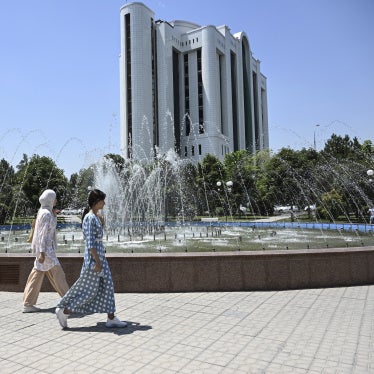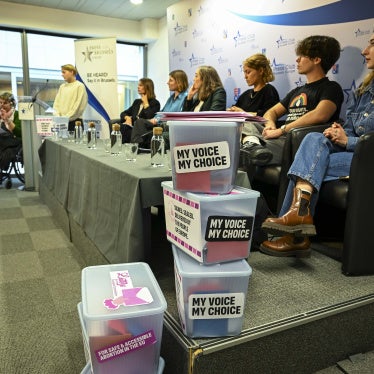After almost a decade of dismay at U.S. policy, it was wonderful for those of us in Europe who work on women's rights to witness the U.S. Secretary of State stand up in Congress and say, "We happen to think that family planning is an important part of women's health," and, "Keeping women and men in ignorance and denied access to services actually increases the rate of abortion."
This new, refreshing tide of realism and sense of priority in Washington should spur us urgently to reflect on our own countries' records. This will be a lot harder than just blaming Bush.
During the past months, I have been meeting here about women's issues with European Union countries. In general, the future looks bright, with the EU presidency coming up for both Sweden and Spain, which have given priority to some of these issues. However, general attitudes can still be sexist as the remark by one diplomat -- "I like women's rights, because I like women" -- indicates.
More important, sexual and reproductive health rights remain a huge problem for European policy makers. Whenever the topics "gender," "women," or even "health" come up in development aid council discussions in Brussels, the session inevitably turns into a fight about abortion.
Some countries have made ending maternal mortality their priority, and they push for services like family planning, safe and legal abortion and obstetric care both at home and in their development policy. Several European countries, the UK and the Netherlands, for instance -- saved thousands of women's lives during the years of the Bush administration by filling what we called the "decency-gap."
They provided money and political support to fill the gap left because of the withdrawal by the U.S. of all funds for the UN Population Fund (UNFPA) and its global gag rule, requiring non-governmental organizations that received US funding to refrain from even discussing abortion services. Many organizations, including some of the largest family planning providers, had to close much needed clinics in rural areas from Sierra Leone to Ethiopia. European countries made it possible for some to remain open.
Other countries however, including Poland, Ireland and Malta, don't want to address the issue in the EU's development aid budget, on which a majority of countries must agree, because their own domestic policies limit access to safe and legal abortions. There is therefore a deadlock in the Council of the European Union, the most important decision-making body of the EU that brings together the 27 EU countries.
A diplomat from a progressive country expressed the tension last month: "I am so sick of this topic. I know it's bad, but I'd rather not talk about it at all." This may sound flippant to women who are this issue and live it every day, but the discussions are painful. Every comma is debated, every country has its "line to take" and position to defend and everyone knows how the debate will end: Without any change. In fact, according to the latest data, funding for family planning and basic reproductive health services in poor countries fell by 7.8 percent, a loss of more than $160 million. Unfortunately, this debate affects people far from the halls of Brussels.
It is about Lisa, whom I saw about a year ago in a clinic in Addis Ababa, Ethiopia. She was 12 years old and came into the small facility with excruciating pains and high fever. She had been raped by a family member and wanted to have an abortion. She was told to by a local "doctor" to swallow acid and rub it all over her genital area. The skin on her thighs, vagina, and stomach was stripped off completely and seriously infected. Lisa died the next day.
Girls like her do not have a voice in this debate. Funding, knowledge and political support from European and US donors can help girls like Lisa to make more informed decisions and to have access to affordable and safe abortion services if necessary. The same goes for the 500,000 women who die every year from giving birth.
The U.S. has the opportunity and duty now to turn the tables and urge the Europeans to unite in the struggle to prevent women from dying for no reason other than discrimination, lack of information and lack of funds. The US has been in shamefully painful labor when it comes to maternal health and abortion for almost a decade; now it is time to push.








